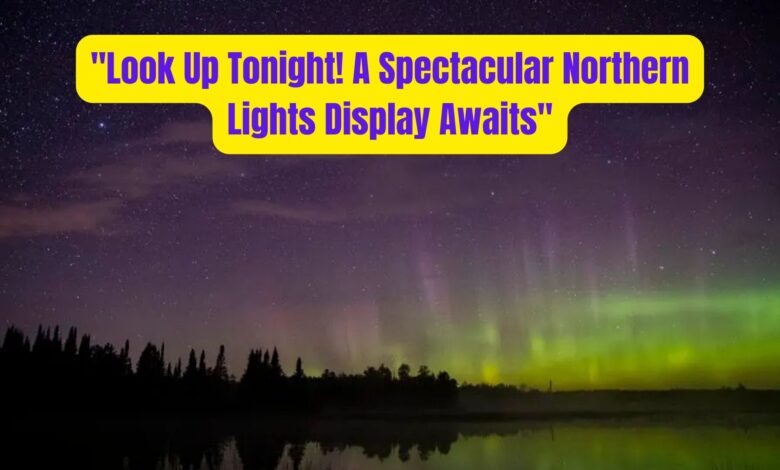“Look Up Tonight! A Spectacular Northern Lights Display Awaits”


Introduction to the Northern Lights
The northern lights tonight could be one of the best displays we’ve seen in years! These lights, also known as the aurora borealis, are a natural light display primarily seen in high-latitude regions. The beautiful dance of colors in the sky can turn an ordinary evening into something truly extraordinary.
What Causes the Northern Lights?
The aurora borealis is caused by charged particles from the sun colliding with the Earth’s atmosphere. When these solar particles hit oxygen and nitrogen molecules high above the planet, they create the stunning light show that we know as the northern lights. The best time to see this celestial event is during solar storms, which increase the visibility and intensity of the auroras.
How to Spot the Northern Lights Tonight
Are you eager to catch the northern lights tonight? Chief meteorologist Chris Justus says the key is to look towards the north, especially between 9 p.m. and 1 a.m. during the solar flare peaks. The auroras may be visible to the naked eye, but if you want to enhance your experience, using your phone camera can reduce ambient light and bring out the lights’ vivid colors.
Optimal Times for Viewing the Northern Lights
According to Chris Justus, the solar flare will have various peaks of intensity, making the best time to view the northern lights between 9 p.m. tonight and 1 a.m. tomorrow. For the best chances, be prepared to head outside during these hours and give your eyes time to adjust to the dark.
Chief Meteorologist Chris Justus’ Forecast
Chris Justus, a well-known chief meteorologist, has forecast that tonight’s northern lights will be exceptionally bright and visible in several regions. He advises staying patient, as the lights may go through periods of heightened and lowered activity due to the fluctuating intensity of the solar flare.
Understanding Solar Flares and Their Impact on the Aurora Borealis
Solar flares are eruptions of electromagnetic energy from the sun. When these flares reach Earth’s atmosphere, they excite the molecules, producing the famous light display. The strength of the northern lights depends on the magnitude of the solar flare, which will vary tonight.
Will the Northern Lights Be Visible Tonight in Your Area?
If you’re in regions that are far north, such as Alaska, Norway, or even northern parts of the USA like Michigan or Minnesota, your chances of seeing the northern lights tonight are quite high. However, for those in more southern latitudes, visibility may be limited unless the solar flare is strong enough. According to Chris Justus, even areas like South Carolina could catch a glimpse under the right conditions .
Top 5 Best Locations to View the Northern Lights
- Fairbanks, Alaska
- Tromsø, Norway
- Yellowknife, Canada
- Reykjavik, Iceland
- Isle of Skye, Scotland
These locations are renowned for their regular northern lights displays. If you’re in any of these areas tonight, you’re in for an unforgettable experience.
Using Your Phone Camera to Enhance the Experience
Though the northern lights are visible to the naked eye, using your phone camera can add extra clarity and vibrancy to the spectacle. Modern phone cameras can adjust to low-light conditions, capturing the colors more vividly by reducing ambient light.
What to Expect: Different Phases of Aurora Intensity
Throughout the night, the aurora borealis will go through different phases of intensity. Initially, the lights may appear faint, but as the solar flare increases, the brightness and color variety will intensify, creating a mesmerizing light show.
Preparing for the Northern Lights: Tips for Beginners
- Dress Warmly: The nights can get cold, especially in high-latitude regions.
- Find a Dark Spot: Avoid city lights for the best view.
- Be Patient: The northern lights may take time to appear at full intensity.
- Use a Camera or Binoculars: Enhance the viewing experience.
What Weather Conditions Are Ideal for Viewing?
Clear skies are essential for spotting the northern lights. Overcast or rainy weather can block your view, so check the local weather forecast before heading out.
How Long Do the Northern Lights Last?
The aurora borealis can last anywhere from a few minutes to several hours, depending on the solar activity. Tonight, the lights may flicker on and off, with peak activity expected between 9 p.m. and 1 a.m.
Fun Facts About the Northern Lights
- The northern lights can also be seen in the southern hemisphere, where they are called the aurora australis.
- The aurora has been seen as far south as Texas during intense solar storms.
- Different gases produce different colors: oxygen creates green and red, while nitrogen gives off blue and purple hues.
Why You Shouldn’t Miss Tonight’s Show
The northern lights tonight promise to be a spectacular event. With the forecast from Chris Justus, we know that the solar flare will offer plenty of opportunities for viewing. Whether you’re a seasoned aurora chaser or a first-time viewer, tonight’s light show is an experience you won’t want to miss.



